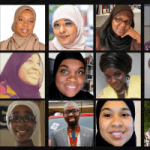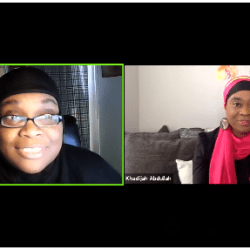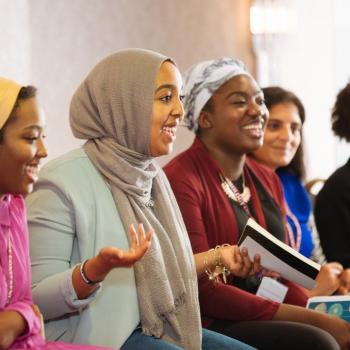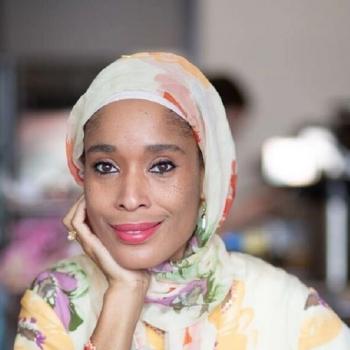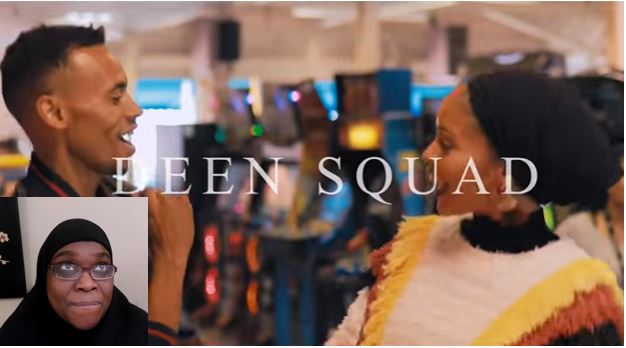
By Layla Abdullah-Poulos
Art comprises a vast spectrum of ways to relay an array of expressions of creators from various socio-cultural backgrounds and standpoints. Additionally, there is the constant potential for subjective interpretations that may or may not jibe with the intent of the artist.
Consequently, art in all its forms is extremely subjective, something with which artists must always contend, especially when venturing into the sphere of social commentary.
When artists reach outside of their individual experiences and extend their crafts to social issues, then there is an increased potential that their work will be critiqued for content and execution from an expanse of examiners, including those directly affected and who may have better knowledge about the topic. As a result, given perspectives may reveal some problematic messaging – the artist’s intent notwithstanding.
Recently, rappers came out with two videos addressing racism in ways to which some people took exception. Rapper Joyner Lucas released “I’m Not a Racist,” wherein a White racist in a Trump hat spews a bunch of stereotypes at a Black man. The Black man retorts, and the two men hug in the end.
Similarly, a new video by Muslim rap group Deen Squad addresses racism but in the context of interracial relationships. A montage of bi-racial Muslim couples serves as the backdrop of the group’s song “No Racism in Islam – #HalalLovin.”
Both songs received criticism about content and execution, specifically about how they missed the mark in effectively addressing the issue of racism in the country and American Muslim communities.
Productive Criticism
As a result of a deluge of criticism about Joyner’s song, The Root posted The Truth about ‘I’m Not Racist’ video and outline multiple problems with the execution of the artist’s video. In the video, rappers Mysonne and Osiris Antham explained how Joyner’s lyrics supported “the White supremacist’s views” and reflected “the reality of the miseducation about our history.” They further expounded on the problem of the optics presented by the hug at the end. The artists then offered some strategic approaches by creating remix videos responding to the racist character in Joyner’s original video.
The response video demonstrates how art as social commentary can prompt conversations containing negative and positive feedback as well as strategies for improvement.
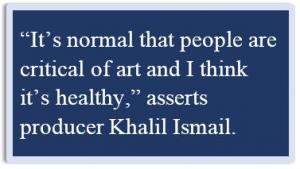 Criticism is not a four-letter word in the arts, culture, and creativity, at least it shouldn’t be. Positive criticism is integral to artists’ development and honing their craft. “It’s normal that people are critical of art and I think it’s healthy,” asserts producer Khalil Ismail. “What has disturbed me about Muslims is just how it will move to the tearing down of character.”
Criticism is not a four-letter word in the arts, culture, and creativity, at least it shouldn’t be. Positive criticism is integral to artists’ development and honing their craft. “It’s normal that people are critical of art and I think it’s healthy,” asserts producer Khalil Ismail. “What has disturbed me about Muslims is just how it will move to the tearing down of character.”
Therefore, it is important that criticism focus on the art and not the artist, and Muslims presenting their works to society should expect and grow from productive criticism.
Expecting such criticism is augmented when art is meant to be representational of Muslim cultural experiences. “As for Muslims who put themselves out there as “representatives” of a cause or fighting the good fight,” says Ismail, “they do deserve more scrutiny because nobody took a vote on it.”
There are no Muslim collectives overseeing artists while they create, nor should there be. Muslim artists create, fellow artists, experts, commentators and members of the culture respond.
No Racism in Islam Slogan Hurts more than Helps
In spite obvious good intentions, as anti-racism social commentary, Deen Squad’s video “No Racism in Islam – #HalalLovin” is ripe with problematic messaging and reinforces false notions about racial suppression against which Black Muslims, advocates, and activists continually battle.
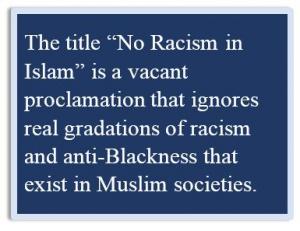 The title “No Racism in Islam” is a vacant proclamation that ignores real gradations of racism and anti-Blackness that exist in Muslim societies. To assert “no racism in Islam” removes adherents from the equation of the faith. Ideally, the Deen is intrinsically tied to the mindsets and interactions of Muslims as well as the gamut of applications.
The title “No Racism in Islam” is a vacant proclamation that ignores real gradations of racism and anti-Blackness that exist in Muslim societies. To assert “no racism in Islam” removes adherents from the equation of the faith. Ideally, the Deen is intrinsically tied to the mindsets and interactions of Muslims as well as the gamut of applications.
Islamic teachings contain anti-racist concepts that the slogan fails to appreciate. The Prophet (saws) did not disregard the racial proclivities of some Sahabah; he addressed them and other human frailties that plagued even the best of our Ummah because spiritual development occurs through personal growth.
Disassociating Islam from its devotees (and their flaws) reduces it to a disjointed religious ideology instead of a way of life (deen), which is demonstrated via perfunctory approaches to teaching Islam so common in modern Muslim societies and why issues like anti-Blackness and racism endure.
The group’s “No Racism in Islam” joins a bevy of tiresome dismissive truisms[1] purported by Muslims who either want to avoid talking about racial inequities or do not have the wherewithal to effectively tackle them and verse the multitude of Muslims embracing concepts of deluded superiority.
Interracial Does Not Mean Anti-Racist
Although initially visually-appealing, critical inspection of the portrayals in the video reveals that the group reinforces the erroneous idea that interracial intimacy and marriage negates the existence of racism. It simply does not.
Intimacy with someone of a different race does not automatically denote that one does not embrace racial concepts taught in race-based societies or safeguard someone from engendering racial microaggressions, bias, and hate.
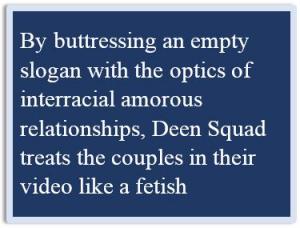 Having a Black girlfriend did not stop police officer Justin Volpe from assaulting Abner Louima, and it didn’t keep slave owners from having children with enslaved African American women – who they in turn owned.
Having a Black girlfriend did not stop police officer Justin Volpe from assaulting Abner Louima, and it didn’t keep slave owners from having children with enslaved African American women – who they in turn owned.
Globally, racism continues to be the bane of society despite interracial dating and marriage; the Muslim ummah is no exception. To promote the idea that biracial marriages are the answer to ending racism in Muslim cultures lays at the feet of couples already facing unique challenges responsibility for bringing the ideals of Muslim comradery and fraternity in the context of shared faith to fruition. That’s neither the purpose of entering interracial marriages nor do people in such relationships automatically attain the tools to do so.
By buttressing an empty slogan with the optics of interracial amorous relationships, Deen Squad treats the couples in their video like a fetish; the word “cringe” was used a lot in the comments section of my Facebook post.
For the sake of “pop Muslim” concepts that shallowly address substantial social issues, the group discounts the realities of encountering racism as a result of these types of unions.
Race and Nationality are Not the Same
The conflation of nationality with race is also troublesome. For some reason, the couples start wrapping themselves with flags, creating a jumbled mess of race, ethnicity, and national identity. Racial issues can extend into social intersections. African Americans, Afro-Latinos, Black Arabs all experience levels of anti-Blackness along intersections of nationality and ethnicity. Gender doesn’t insulate Black women from experiencing racism from non-Black women nor does faith safeguard Black Muslim women from the same.
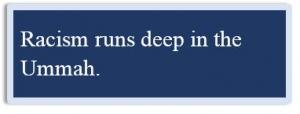 Deen Squad’s apparent attempt to have a kumbaya moment resulted in a production with disturbing messaging that overlooks the racial trauma so many Muslims are already prepared to flout. With their ostensible “stand” against racism, the rappers made it easier for already complacent Muslims not to start caring about purging it from our Ummah. After all, look at those finely-dressed interracial couples with smiles on their faces and stars in their eyes. There couldn’t possibly be a problem, right?
Deen Squad’s apparent attempt to have a kumbaya moment resulted in a production with disturbing messaging that overlooks the racial trauma so many Muslims are already prepared to flout. With their ostensible “stand” against racism, the rappers made it easier for already complacent Muslims not to start caring about purging it from our Ummah. After all, look at those finely-dressed interracial couples with smiles on their faces and stars in their eyes. There couldn’t possibly be a problem, right?
Racism runs deep in the Ummah. If Muslim entertainers like Deen Squad want to tread those waters, it would be best to talk to fellow Muslim artists already wading through racial issues as well as seek knowledge from Muslim anti-racists. The Muslim Anti-Racism Collaborative is a great place to start.
[1] “Allah doesn’t see color” is my personal favorite – so, Allah can’t see?



